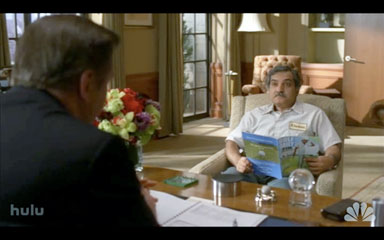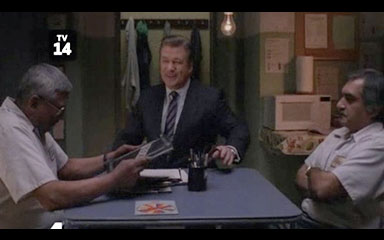All the world’s a stage—especially the classroom
When I first started teaching, I assumed that my primary responsibility as a teacher was to “deliver content”. Accordingly, I focused my efforts on delivering the content in the textbook—of which there was a lot, far more than any reasonable person could be expected to teach (or learn) in a semester. So I talked quickly, covered a chapter a week, and prayed that my students would be able to make sense of it. I was, of course, a terrible teacher.
I recall that in my very first semester as an Assistant Professor, I had just turned 26 and was assigned to teach a part-time MBA class. I was the youngest person in the room; the average age of my students was maybe 35. They ate me for breakfast, pretty much.
 I emerged from those early experiences somewhat battle-scarred but wiser for it. I learned that (a) teaching is performance, at least in part, and (b) content is good to have, but it doesn’t by itself make for an effective teacher. These were revelations to me. I came from an educational system modeled on the British system. It is based on the notion of “received wisdom”, with the professor as the fount of all knowledge and the student expected only to record those words of wisdom and say very little. So the notion that I had to go beyond merely delivering content to be considered a good teacher was, for me, an eye-opener.
I emerged from those early experiences somewhat battle-scarred but wiser for it. I learned that (a) teaching is performance, at least in part, and (b) content is good to have, but it doesn’t by itself make for an effective teacher. These were revelations to me. I came from an educational system modeled on the British system. It is based on the notion of “received wisdom”, with the professor as the fount of all knowledge and the student expected only to record those words of wisdom and say very little. So the notion that I had to go beyond merely delivering content to be considered a good teacher was, for me, an eye-opener.
At the time, because of my lack of experience in the classroom I was too anxiety-ridden to focus on being a “performer”, unlike some of my senior colleagues who were legendary for their theatrics and personality. One professor was famous for leaping on top of his desk when the class discussion got animated; another, who taught an 8 a.m. class, so intimidated his students that late-comers would not dare enter the class but would sit on the floor just outside the open door, taking notes. (Outside the classroom, however, these professors were perfectly normal and nice people.)
My teaching style, as it has evolved over the years, has been far less dramatic than the examples I mentioned. But what has helped me immeasurably in developing it, and becoming a more effective teacher as a result, has been my long-standing interest in theatre and acting.
 Though I have been performing on stage since I was ten or eleven, my first real exposure to theatre was in college in India. My college had a student club called the Shakespeare Society (advertised, somewhat tongue-in-cheek but not inaccurately, as the “only Shakespeare Society east of the Suez”). Its mission was to produce, for pretty much no budget, one play from the Bard’s canon each year. In my freshman year, the annual Shakespeare play was Antony and Cleopatra. I played Cleopatra’s palanquin bearer, and my primary responsibility was to carry her, reposing regally on her palanquin, up a long ramp that ran through the audience to the stage. My costume was nothing more than a loin cloth, which presumably was considered haute couture for palanquin bearers in those days. The ramp was barely the width of the palanquin (the budget did not allow for wider), and as a result I couldn’t see its edges, especially as I was blinded by the lights. Long story short: I never actually fell off the ramp in mid-show and tossed Cleopatra head-first on to the auditorium floor, but I think I came close. Not surprisingly, that is not my favorite theatrical memory, but on the plus side I struck up a friendship with Cleopatra that still endures. Many years later, she became a successful film director and gave me my first major role in a film, in September 11.
Though I have been performing on stage since I was ten or eleven, my first real exposure to theatre was in college in India. My college had a student club called the Shakespeare Society (advertised, somewhat tongue-in-cheek but not inaccurately, as the “only Shakespeare Society east of the Suez”). Its mission was to produce, for pretty much no budget, one play from the Bard’s canon each year. In my freshman year, the annual Shakespeare play was Antony and Cleopatra. I played Cleopatra’s palanquin bearer, and my primary responsibility was to carry her, reposing regally on her palanquin, up a long ramp that ran through the audience to the stage. My costume was nothing more than a loin cloth, which presumably was considered haute couture for palanquin bearers in those days. The ramp was barely the width of the palanquin (the budget did not allow for wider), and as a result I couldn’t see its edges, especially as I was blinded by the lights. Long story short: I never actually fell off the ramp in mid-show and tossed Cleopatra head-first on to the auditorium floor, but I think I came close. Not surprisingly, that is not my favorite theatrical memory, but on the plus side I struck up a friendship with Cleopatra that still endures. Many years later, she became a successful film director and gave me my first major role in a film, in September 11.
Once I moved to New York and began my pursuit of an academic career, all my thespian interests fell by the wayside. For one thing, I had no time to think about anything but teaching and research. For another, there were zero opportunities on stage or screen for South Asian actors like myself. My first break, so to speak, came when I moved to Montreal to teach at McGill University, and discovered a multicultural theater company called Teesri Duniya (meaning “Third World” in Hindustani) that believed in color-blind casting and encouraged its members to develop their own scripts. I joined the company, and in the next few years I learned a lot about working with diverse actors and about issue-oriented theater, which was the company’s focus. Thanks to Teesri, not only did I get back into acting, I also got the opportunity to develop my interests in music and scriptwriting and showcase my work in our productions.
Fast forward to 1999, when I moved back to New York. I suddenly discovered that the theater scene here had changed; there were a lot of young, amazingly good, actors of South Asian origin here, graduates of film and drama schools, who were getting work pretty regularly. In the last few years it has been exciting to see that the number of talented young South Asian actors, and the opportunities available for them on stage and screen, have increased manifold (there is now even a show, Outsourced, set entirely in Mumbai). Because of my age, I get to play a range of “mature” characters such as cab drivers, store owners, janitors, doctors, diplomats, professors (those I can almost phone in), and that mainstay, the patriarchal South Asian father. Mostly these roles are one-liners, sometimes more. Occasionally something really “meaty” comes along, like the guest star turn I did in 30 Rock a year ago. That was probably the most fun thing I have done as an actor, and as a bonus I got to work with the fantastic and incredibly talented actor Alec Baldwin.
Of course, the main reason I enjoy working as an actor is that I don’t have to. If I had to depend on it for a living I would probably be foraging for meals in dumpsters. So I have tremendous respect for actors who stick it out despite the daily rejections, the starvation wages and the multiple odd jobs on the side. I am fortunate indeed to not have to join their ranks. And I am especially lucky that I am a member of a noble profession that has so much synergy with my interest in theater and performance.
One of my professors in graduate school used to say: “a professor is someone who approaches every subject with an open mouth”. At the time I thought this was very funny (and empirically accurate), but I have come to believe that this is not a viable strategy in the classroom. Teaching, as someone once said, is the art of keeping your mouth shut—at least some of the time. Unfortunately, that zen-like state of non-teaching is hard to achieve, especially when you can feel all those eyes in the classroom on you, waiting for you to say something. I certainly can’t claim to have mastered the art of non-teaching. But perhaps I have learned something about performance through my years of teaching—and learned a lot about teaching through my experience as a performer.